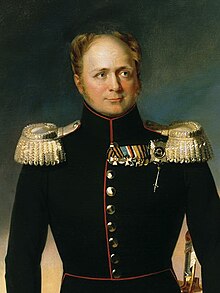Aleksandr I
| Alexander I | |||||
|---|---|---|---|---|---|
 |
|||||
| Reign | 23 March 1801 – 1 December 1825 | ||||
| Coronation | 15 September 1801 | ||||
| Predecessor | Paul I | ||||
| Successor | Nicholas I | ||||
| Born |
23 December 1777 Saint Petersburg, Russian Empire |
||||
| Died | 1 December 1825 (aged 47) Taganrog, Russian Empire |
||||
| Burial | Peter and Paul Cathedral | ||||
| Consort | Louise of Baden | ||||
| Issue more... |
Nikolai Lukash | ||||
|
|||||
| House | Holstein-Gottorp-Romanov | ||||
| Father | Paul I of Russia | ||||
| Mother | Sophie Dorothea of Württemberg | ||||
| Religion | Russian Orthodox | ||||
| Signature |  |
||||
| Full name | |
|---|---|
| Alexander Pavlovich Romanov |
Alexander I (Russian: Александр Павлович, Aleksandr Pavlovich; 23 December [O.S. 12 December] 1777 – 1 December [O.S. 19 November] 1825) reigned as Emperor of Russia from 23 March 1801 to 1 December 1825. He was the son of Paul I and Sophie Dorothea of Württemberg. Alexander was the first Russian King of partitioned Poland, reigning from 1815 to 1825, as well as the first Russian Grand Duke of Finland. He was sometimes called Alexander.
He was born in Saint Petersburg to Grand Duke Paul Petrovich, later Emperor Paul I, and succeeded to the throne after his father was murdered. He ruled Russia during the chaotic period of the Napoleonic Wars. As prince and emperor, Alexander often used liberal rhetoric, but continued Russia's absolutist policies in practice. In the first years of his reign, he initiated some minor social reforms and (in 1803–04) major, liberal educational reforms, such as building more universities. Alexander appointed Mikhail Speransky, the son of a village priest, as one of his closest advisors. The Collegia was abolished and replaced by the State Council, which was created to improve legislation. Plans were also made to set up a parliament and sign a constitution.
In foreign policy, he changed Russia's position relative to France four times between 1804 and 1812 among neutrality, opposition, and alliance. In 1805 he joined Britain in the War of the Third Coalition against Napoleon, but after the massive defeat at the Battle of Austerlitz he switched and formed an alliance with Napoleon by the Treaty of Tilsit (1807) and joined Napoleon's Continental System. He fought a small-scale naval war against Britain between 1807 and 1812. He and Napoleon hardly agreed, especially regarding Poland, and the alliance collapsed by 1810. The tsar's greatest triumph came in 1812 as Napoleon's invasion of Russia proved a total disaster for the French. As part of the winning coalition against Napoleon he gained some spoils in Finland and Poland. He formed the Holy Alliance to suppress revolutionary movements in Europe that he saw as immoral threats to legitimate Christian monarchs. He helped Austria's Klemens von Metternich in suppressing all national and liberal movements.
...
Wikipedia
